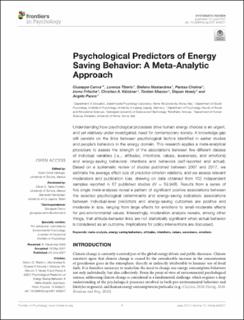| dc.description.abstract | Understanding how psychological processes drive human energy choices is an urgent, and yet relatively under-investigated, need for contemporary society. A knowledge gap still persists on the links between psychological factors identified in earlier studies and people's behaviors in the energy domain. This research applies a meta-analytical procedure to assess the strength of the associations between five different classes of individual variables (i.e.,: attitudes, intentions, values, awareness, and emotions) and energy-saving behavioral intentions and behaviors (self-reported and actual). Based on a systematic review of studies published between 2007 and 2017, we estimate the average effect size of predictor-criterion relations, and we assess relevant moderators and publication bias, drawing on data obtained from 102 independent samples reported in 67 published studies (N = 59.948). Results from a series of five single meta-analyses reveal a pattern of significant positive associations between the selected psychological determinants and energy-saving indicators: associations between individual-level predictors and energy-saving outcomes are positive and moderate in size, ranging from large effects for emotions to small-moderate effects for pro-environmental values. Interestingly, moderation analysis reveals, among other things, that attitude-behavior links are not statistically significant when actual behavior is considered as an outcome. Implications for policy interventions are discussed. | en_US |

